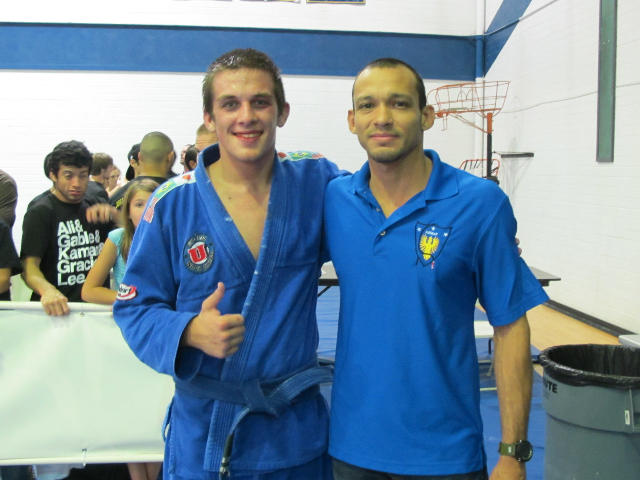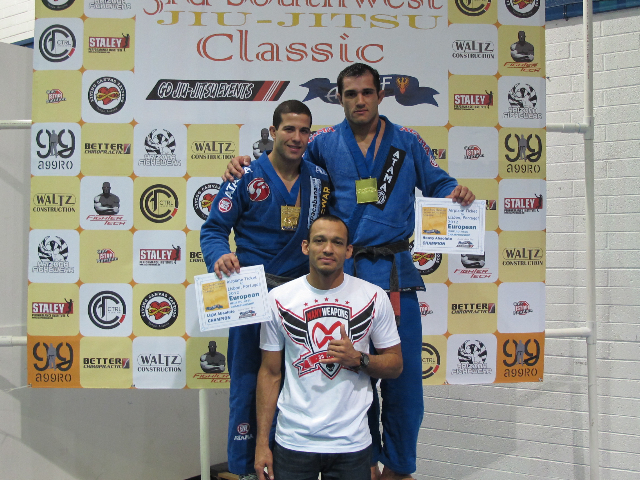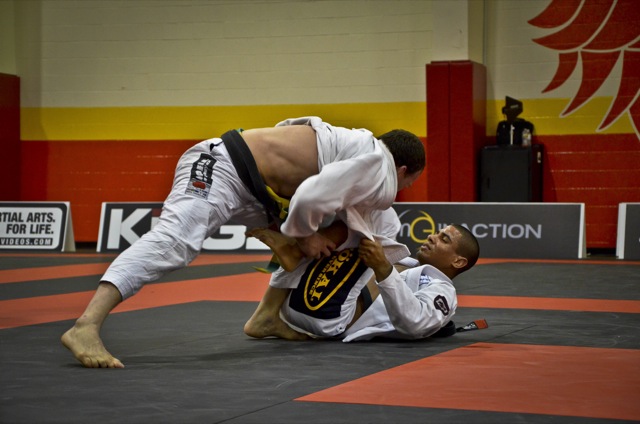Nova União’s Gustavo Dantas wears a lot of hats – and wears them all to perfection. He’s the vice president of the AZSBJJF, he’s the professor and mentor to hist students at Gustavo Dantas Jiu-Jitsu (GDJJ) academy, and he is also the owner of GDJJ events, which puts on four major Jiu-Jitsu tournaments a year. Last weekend was his 3rd Southwest Brazilian Jiu-Jitsu tournament.

Gustavo at the 3rd SW Classic with his student John Owning / photos: Deb Blyth
This year the turnout was unusually low. Last year there were 620 competitors, and this year there were 570, but he chalks it up to the fact that there are so many tournaments around these days. This doesn’t bother him, though, because he gears his tournaments towards the Jiu-Jitsu folks in Arizona. “About 90% of the competitors are from Arizona,” he says, “We got a big group from New Mexico this year, though. They said there was a tournament in Albuquerque, but they came to my tournament instead, so that was good to hear.”
Gustavo says he thinks about Jiu-Jitsu “24/7.” He’s a big fan of the IBJJF and always has been, so when he first got into the tournament business, he used them as a mirror. “I wanted to get my students ready for the big events and so I wanted to run mine in the same format as the IBJJF’s,” he says, “I think if my tournaments are at this level today, it’s because of what they’ve been doing over the years. People don’t realize the IBJJF came here in ’95 and threw a Pan for 150 people in Irvine. Today, they have over 2,000 competitors. Someone had to plant the seed, and they did. I’m trying to grow with them and learn from them.”
One thing about Gustavo’s tournaments that mirrors the IBJJF’s is the fact that they are organized and on time. He says it’s because his “team” makes it happen. “My fiancé, Kristina (Barlaan), and I… that’s my team,” he smiles, “I’m a perfectionist. When I first started this venture, I made a list of everything I liked when I went to a tournament and then tried to create that in mine. I like a nice shirt, I like it to be on time, I like to get a nice medal, have fair refs, I like an organized event… not a zoo trying to walk around… everything you like, I try to provide. Is it perfect? No, but I strive for perfection.”
Gustavo knows that mistakes are going to happen, but he wants to minimize them as much as he can. “Over the years I’ve compiled a high level of referees,” he says, “(Gracie Fighter black belt) Samir Chantre is the director of refereeing. He knows what’s going on. I need to have 12 refs, two for each area. There’s not enough qualified refs in Arizona, and I make sure all my refs are IBJJF certified, so I fly them in. I gotta do it. I want to have a legitimate tournament. Mistakes are always gonna happen, but having more experienced refs minimizes those mistakes.”

Gustavo with winning pro division black belts, Tanquinho and Marcel Fortuna
To add to his already highly respected tournaments, Gustavo started paying money rewards to the winners in his black belt pro division in 2006. This year the theme of the 3rd Southwest Classic Black Belt pro division was “take us to Portugal,” and he gave out two plane tickets to Portugal so the winning black belts could attend the Europeans on him. He divided the classes into a lightweight and heavyweight open so a couple of different black belts had the opportunity to win. This year, Augusto “Tanquinho” Mendes of Soul Fighters won the lightweight absolute and Marcel Fortuna of Ralph Gracie won the heavyweight division.
“It’s always fairly small,” he says of the group of black belts who come to his events, “Last spring we had 16 black belts, but this time we only had five. I was a little disappointed, but I’m always learning with every event.”
Gustavo says, ultimately the most important thing to him is getting the local community to participate in his tournaments. “They always support my events and they keep coming,” he says, “The tournaments keep growing. People get excited to compete and those who don’t compete come to support their teammates and friends.”
Many people involved in Jiu-Jitsu have families, and they can’t travel all the time, so Gustavo likes providing them with family-friendly, quality events. “Having good quality tournaments in Arizona means they only have to travel if they want to,” Gustavo says, “They don’t have to travel anymore. It’s perfect. They can get a good experience here, at home in Arizona.”
Gustavo thinks competing is important because it provides a learning experience and a challenge for people. It’s really easy for people to deal with a win, but the bigger challenge is to deal with a loss, to deal with failure. “Competing allows you to prove to yourself that you can get it done. You can go back, train more and try again. You test yourself, your limits and your character. You learn not to quit in tough moments. It’s a horrible feeling to lose. You feel like you could have done better and some people don’t ever want to feel that way again, so they decide never to compete again. Others think, ‘I know I can do better, so I want to try again.’ When people say ‘you learn the most when you lose,’ they are absolutely right.”
As for kids competing, Gustavo thinks along the same lines but with a little bit of a twist. “I think competing shows them that life isn’t perfect and that it’s not always going to be wonderful and go your way. You’re going to have some difficulties. You’re gonna lose sometimes, but if you just try your best and it doesn’t work out this time, it will work another time. And it’s ok to lose, too. I always tell my son stories about how I lost and messed up so he knows we all have good and bad times. I say, ‘Daddy lost, too. It’s fine.’”
Gustavo wants to eventually organize an in-house Nova União tournament, but most importantly, he just wants to have the most respected tournaments in the world. “I want to make sure people are happy with them,” he says, “I want them to know that there’s gonna be tough competition at my events and that we’re going to keep growing. Very often people are surprised at the high level of competition they can get here. Many people think there’s no Jiu-Jitsu in Arizona, but they are sadly mistaken. They think they’re going to run over everybody here, but they can’t.”

